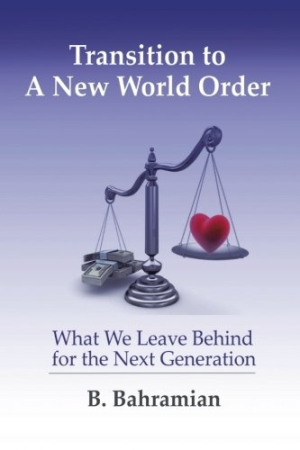Transition to a New World Order
What We Leave behind for the Next Generation
“If a New World Order is to be successful, the goal will have to be good wages, benefits, and working conditions for all people, regardless of where they live.” So states educator, administrator, and business and technology consultant B. Bahramian in Transition to a New World Order: What We Leave Behind for the Next Generation.
Bahramian believes that creating this particular “New World Order” will require a combination of three key components: technology, education, and democracy. Education is particularly vital, he asserts, for it “shapes the prosperity and standard of living of any society.” Creating opportunities for change is vital, especially in light of the fact that the “overall quality of life for a majority of the world’s population is declining drastically.” Failure to correct the disparity between the haves and the have-nots, Bahramian prophesizes, will only increase the potential for world terrorism.
Transition to a New World Order reads like a course of university lectures or a series of essays in political, economic, and social science. Its ten main chapters are subdivided into 150 sections and cover such diverse topics as the role of the Internet in advancing nations and the rise of China. Bahramian routinely quotes Alexis De Tocqueville, Arthur Schlesinger, Mahatma Gandhi, and other notable thinkers to support his thesis, and then backs up these citations with facts, figures, and charts.
Much of the book is a litany of the evils of poverty and the despair of life in underdeveloped countries. Bahramian chides the rich, as well as big corporations, for their selfish aggrandizement of power and wealth, yet he is not anti-capitalist. He instead pleads for businesses to cease acting like “sovereign powers” and asks them—and those made wealthy by corporations—to offer more than just minimal “contributions to the public interest of their respective nations.”
As would be expected from an educator and former university vice chancellor, Bahramian spends much of the book touting the benefits of expanding educational opportunities for young people, especially those in the developing world. He sees the United Nations as a force for good and for progress, albeit one that is flawed yet fixable. His calls for reform of the world body are heartfelt, as are his pleas for governments and corporations to combat pollution, move toward green energy, and introduce “economic and political reforms that encourage global equality and sustainable growth.”
This is not a book to be tackled lightly or in long sittings. It is best digested in small bites, none larger than a chapter at most. Bahramian challenges his readers to do more than just skim his words, nod in agreement, and turn the page. Much like a good professor, he demands that his audience think about what he says and then find some way to take action.
Reviewed by
Mark McLaughlin
Disclosure: This article is not an endorsement, but a review. The publisher of this book provided free copies of the book and paid a small fee to have their book reviewed by a professional reviewer. Foreword Reviews and Clarion Reviews make no guarantee that the publisher will receive a positive review. Foreword Magazine, Inc. is disclosing this in accordance with the Federal Trade Commission’s 16 CFR, Part 255.

